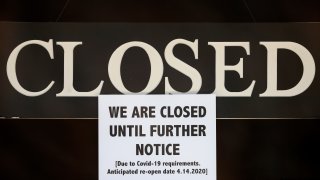
The Small Business Administration’s rescue loan program hit its $349 billion limit on Thursday and is now out of money as the nation’s top Republicans and Democrats struggle to agree on how to restore its funds.
The SBA website reads that it is “unable to accept new applications for the Paycheck Protection Program based on available appropriations funding. Similarly, we are unable to enroll new PPP lenders at this time.”
The announcement from the SBA on Thursday comes as scores of small American business owners work to deal with the fallout of the coronavirus and the move by some states to shutter the vast majority of commerce.
The first-come, first-served Paycheck Protection Program of $349 billion, approved by Congress and signed by President Donald Trump in March, had promised to assuage some of the financial burden for the nation’s smallest business owners.
Signs that the program was reaching critical capacity first came on Wednesday, when the SBA said the aid may be nearing a ceiling for loan commitments, with more than 1.3 million loans given approval at a value of more than $296 billion. By Wednesday evening, $315 billion had been approved, a person familiar with the situation told CNBC.
Staffers for Senate Minority Leader Chuck Schumer and House Speaker Nancy Pelosi are expected to continue talks with the Treasury Department on Thursday, a senior Democratic aide told CNBC. Those discussions will follow a similar one Wednesday afternoon as the nation’s top Democrats and Republicans seek to hash out the new funding just a few weeks after Congress passed the historic $2.2 trillion coronavirus relief spending package.
Business
Though lawmakers appear close to extending funds for the programs, the pace at which U.S. small businesses exhausted the initial $349 billion program likely speaks to the extent and severity state-imposed business closures are having on restaurants, gas stations and other mom and pop retailers across the country.
“Small businesses are the backbone of the American economy, employing 47% of all workers. In high-cost cities, the median small business has only enough cash to cover 2-3 weeks of expenses,” wrote Ron Temple, head of U.S. equity at Lazard Asset Management.
“It’s critical for both parties to recognize the unprecedented stress on small business and their employees from this crisis, and pass incremental funding as an urgent priority,” he added.
Senate Democrats last week blocked a move by Majority Leader Mitch McConnell, R-Ky., to push through an additional $250 billion for the program. Republicans then later rejected Democrats’ proposal that sought $250 billion in funds to small businesses, hospitals, states and food assistance programs.
A historic drop in retail sales in March, a 5 million jump in jobless claims and weaker manufacturing data released this week have all suggested the U.S. economy is likely already in a deep recession. Job losses in the food services and lodging industries, in particular, have led the U.S. economy to erase nearly all the job gains accrued in the last 11 years.
CNBC’s Lauren Hirsch contributed reporting.
This story first appeared on CNBC.com. More from CNBC:
- Airbnb hosts feel the crunch of government bans to stop coronavirus tourism
- Homebuilder confidence index takes biggest monthly dive ever as coronavirus slams economy
- Coronavirus delivers record blow to US retail sales in March



